If you’re a first-year student, then you’ve surely heard about fraternities and sororities. You may even be planning to join one yourself! It’s no wonder: fraternities are mainly associated with fun parties and friendships that last a lifetime.

But did you know that the fraternity alum list includes 18 US presidents, 85% of Supreme Court justices, about 76% of US Senators, and 85% of the top Fortune 500 executives? Joining a Greek organization can also give you a competitive advantage in the eyes of your future employers. And we’re not even talking about how it boosts your leadership and communication skills.
Are you unsure if joining a fraternity or sorority is right for you? This article by StudyCorgi experts will help you make the decision! We will cover everything you need to know about Greek life. Sounds interesting? Then let’s get started!
✨ Fraternities & Sororities Explained
Let’s start with the most important question: what is Greek life? Well, it’s a collective term for fraternities and sororities in college. Here’s what you need to know about them:
- Basically, a fraternity is an academic brotherhood that shares the same goals and helps each other in academic life. In their free time, fraternities organize various events, parties, and competitions. They also actively participate in charity and provide social services. Each of them has its unique rituals and symbols. The Latin word frater (brother) is the source of the word “fraternity.”
- The term “sorority” was first used in 1882 by Gamma Phi Beta—the group of female students at Syracuse University. The Latin word soror means “sister.” These organizations are very similar to fraternities, except they are made up of female students only.
The word “fraternity” became more inclusive with time. It is often used to refer to any Greek organization, regardless of its members’ gender. Besides, many fraternities today allow men, women, and non-binary people to join.
Why Is It Called “Greek Life”?
Fraternities and sororities have used Greek letters since Phi Beta Kappa, the first student society, was established in 1776. Ancient Greek literature was a popular subject to study in higher education at the time. Students liked this naming convention, mainly because Greek letters create an atmosphere of exclusivity and mystery. In addition to displaying Greek letters in their names and clothing, fraternities and sororities often have unique membership requirements and exclusive rites.
Over the past 200 years, Greek life has established a solid base and now has over 9 million members nationwide. It continues to be a significant component of campus culture today.
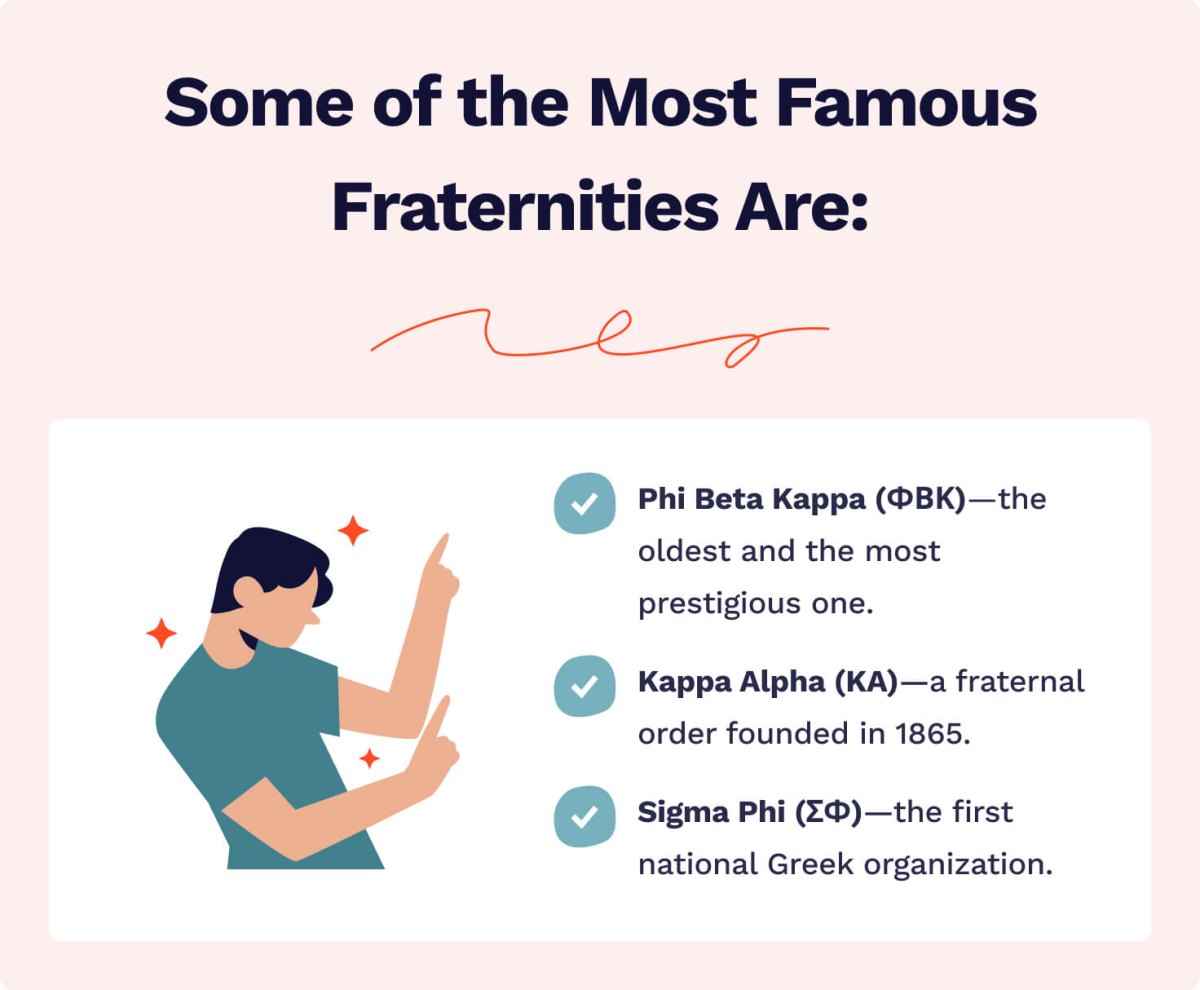
Greek Life Terms You Need to Know
Fraternities are such unique environments that they even have their own jargon. Each word they use has a rich history. Here is a handy glossary that will help you avoid getting lost in the mysterious world of fraternities:
Types of Greek Life
Now that you know the term, it’s time to go deeper into Greek life itself.
Each organization has its own goals, objectives, activities, symbols, and other attributes. Generally, you can choose from 5 different types of Greek organizations. These include:
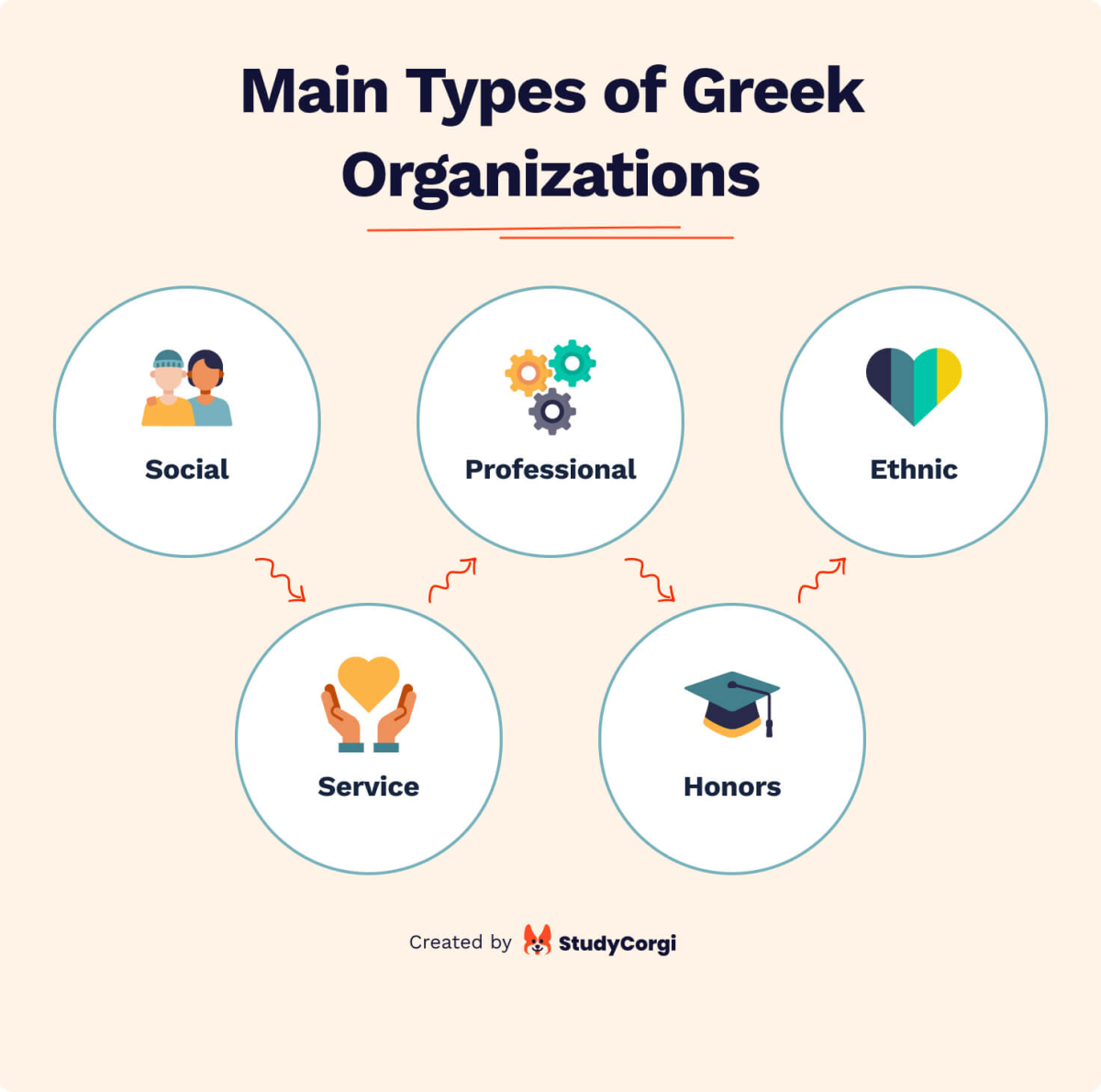
🎉 Pros & Cons of Greek Life
Joining a fraternity can be an exciting and life-changing decision, but it’s not one to be taken lightly. Before making the leap, it’s essential to consider both the benefits and drawbacks of Greek life, so be sure to read this next segment thoroughly.
Let’s start with the advantages. Greek life has many of them, including but not limited to:
✅ Networking.
Sororities and fraternities help you meet other students with strong academic skills. Whenever you need aid with your studies, your “brothers” or “sisters” can lend a hand.
✅ Philanthropy.
Many fraternities have strong ties with national philanthropic organizations. Their members make considerable yearly contributions and participate in various fundraising events.
✅ Improved social skills.
Greek life is all about engaging with your fellow active members. Fraternities often organize engaging discussions and various exciting events, so your social skills will receive a big boost.
✅ Leadership experience.
If you see yourself becoming a leader in the future, then Greek life is for you. Not only will it increase your communication skills, but it will also allow you to actively influence the decision-making process within your organization.
✅ Housing options.
If you’re enrolled in one of your college’s fraternities, you will be given the choice to live in their residences. These are usually huge mansion-like buildings that will amaze you with their scale and comfort.
✅ Job opportunities.
The vast alum networks that are created through Greek life can be a huge help with prestigious job opportunities after graduation. Additionally, belonging to a fraternity can serve as a notable point for your resume.
✅ Lots of fun!
Engaging in Greek life is a great way to spend time, make new friends, and have memorable experiences. Being bored is the last thing that will happen if you’re actively engaged in a fraternity.
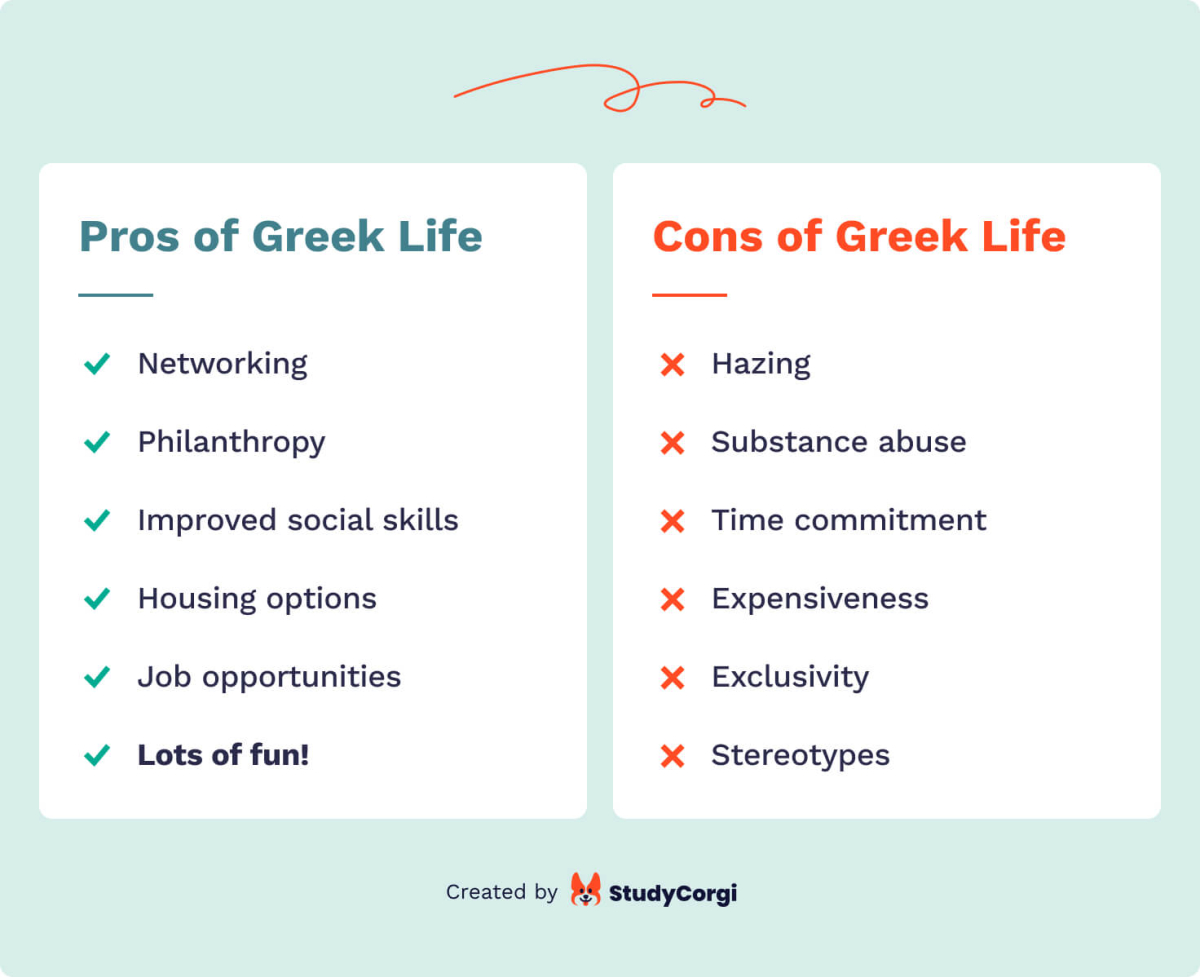
Despite all the perks of Greek life, there are still some serious drawbacks you need to know about. The following disadvantages push away many potential members, lead to scandals, and create a bad reputation for fraternities. Make sure to keep them in mind before making the final decision:
❌ Hazing.
Hazing is the practice of making new fraternity members perform dangerous or humiliating tasks. It can take many forms, such as excessive drinking, physical challenges, sleep deprivation, or public humiliation. Hazing is a dangerous practice that can lead to physical and emotional harm, and many universities and organizations have taken steps to prevent and punish hazing within Greek life.
❌ Substance abuse.
Alcohol is the substance that raises the most concern when it comes to addictions on college campuses. Fraternity members are more likely to binge drink than other students due to peer pressure and easy access to alcohol.
❌ Time commitment.
Fraternities often require members to attend regular meetings, participate in social events, and contribute to the organization’s activities. This can be particularly challenging for students trying to balance studies with part-time jobs.
❌ Price.
The charges (such as an initiation fee and ongoing dues) might be too high for some students. Partly this is due to the high insurance costs fraternities must pay. However, the expense of living at the chapter house is typically not higher than ordinary room and board fees for a college.
❌ Exclusivity.
There are situations where exclusivity can lead to toxicity within a Greek organization. Some members may promote discrimination, but they’re usually dealt with. Still, keep this in mind before joining a fraternity or sorority.
❌ Stereotypes.
Greek life members are often stereotyped as spoiled “frat boys” who party all the time and don’t get along with other students. To explore this further, we’ve decided to cover myths about Greek life in the next segment.
Fraternity Myths Busted
There is always a possibility of negative experiences within fraternities and sororities. Still, what goes on in one chapter doesn’t necessarily happen in all of them. The truth is, people engaged in Greek life actively fight negative aspects and genuinely try to improve the situation.
Unfortunately, the media often promotes anti-fraternity messaging, which can turn people away from Greek life. Besides, with frequent high-profile incidents related to misconduct within fraternities, many people end up associating all of Greek life with dangerous behavior.
Well, we’re here to bust the biggest myths that surround student organizations. Let’s examine them in detail:
Now, you can see Greek life objectively and make a balanced opinion. But before we proceed, let’s have a look at where fraternities come from.
🏺 The History of Fraternities: How It All Began
Students started creating secret organizations in the late 18th century. They gathered together to discuss big events and different topics that weren’t brought up during class. The first fraternity, Phi Beta Kappa Society, was founded in 1776.
In the early days of fraternities, their members typically belonged to the elite social classes and were focused on intellectual pursuits. They often engaged in debates and literary discussions. Fraternities also served as a way for young men to form bonds and establish connections with people of their social class.
Soon after, members also started planning events like parties, sporting competitions, dances, and so on.
The purpose of fraternities and sororities has mostly stayed the same since the 18th century. Their main goal is to advance their members’ social, academic, and professional goals. And, of course, they help their communities.
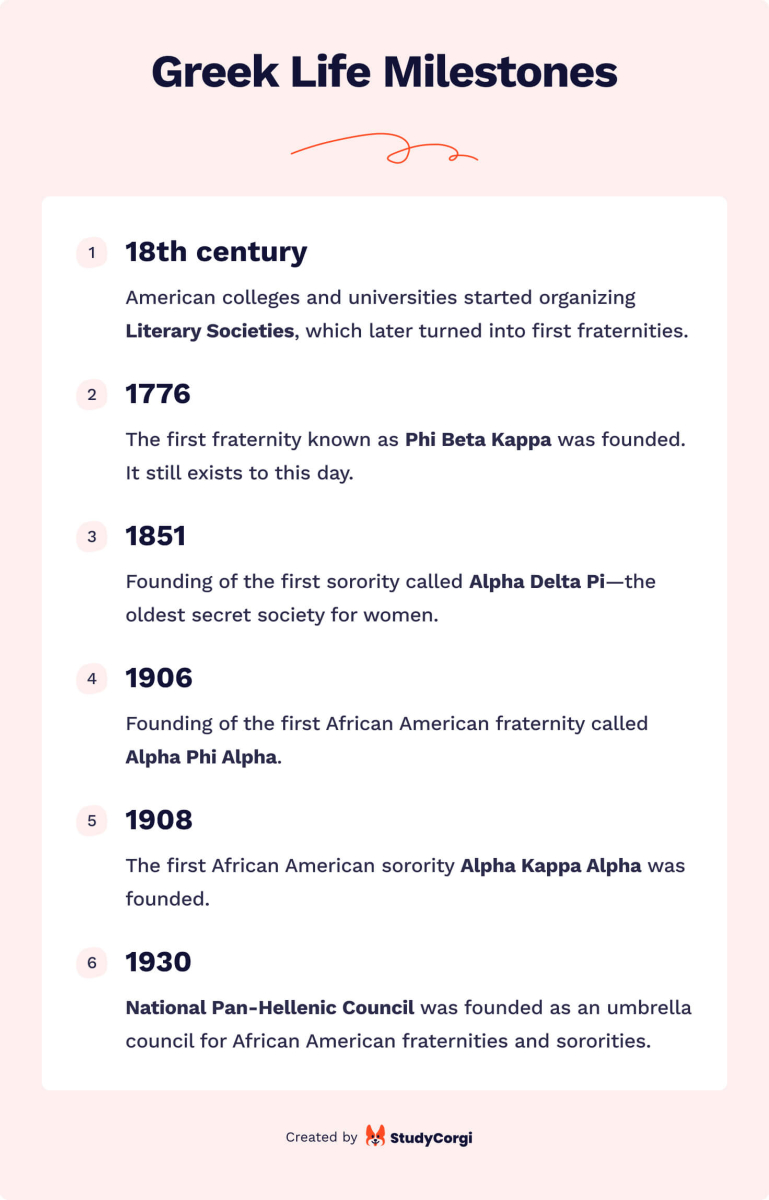
Confronting Greek Life Controversies
Sadly, the history of Greek life in the US has plenty of dark chapters. Perhaps the most notorious are the scandals associated with hazing during freshmen initiations, binge drinking, as well as misogynistic, racist, and homophobic acts. Many fraternities allowed their members to act cruelly and haze new members. It’s primarily because, in the earlier days of Greek life, higher education was available only to privileged members of high society. Although the times were changing, the traditions remained largely the same in secret societies.
Nowadays, the situation is vastly different, but unfortunately, fraternities are still associated with sexual harassment and drug abuse.
Fraternities & Sororities Today
Throughout its existence, Greek life has been continuously improving. Just like society as a whole, it has become more inclusive and mindful of social issues. This is how the things are today:
- Fraternities and sororities still play a major role in campus life. According to statistics, Greek life influences socialization of 67%, shopping behavior of 38%, purchases of 37%, and food choices of 36% of students.
- The number of culturally-diverse organizations has grown exponentially. It’s no longer a place for just one type of student. Now, everybody is welcome to join.
- Fraternities must go through accreditation process. This practice helps to ensure that student organizations meet certain criteria regarding their operations, policies, values, and principles. Accreditation also requires fraternities to follow risk management guidelines which help reduce the likelihood of accidents.
🤔 Is Greek Life Right for You?
Now you know about the advantages and disadvantages of Greek life and how it has changed through time. It’s time to decide whether you should join a fraternity!
If you feel like a membership will harm your financial or academic standing, then it’s better to refrain from joining. Greek life is not for everyone, and that’s completely fine. It’s not obligatory to join, and there are a bunch of other things that you can do instead. For example, there are clubs, faculty events, and many other activities provided by universities.
And if none of the drawbacks bother you, then go ahead and start your Greek life adventure! If you plan to join one of the fraternities or sororities, we’ve prepared a lot of helpful information for you. Continue with this article if you wish to make your Greek life experience as pleasant as possible.
🤩 How to Choose a Suitable Fraternity or Sorority
The first step is to choose the organization that will help you spread your wings and thrive. So, take this step seriously!
- Be honest with yourself about your goals and needs.
- Avoid getting caught up on exclusivity and keep a cool head.
- Take your time and study all the options before making a final choice.
With that in mind, follow the roadmap below:
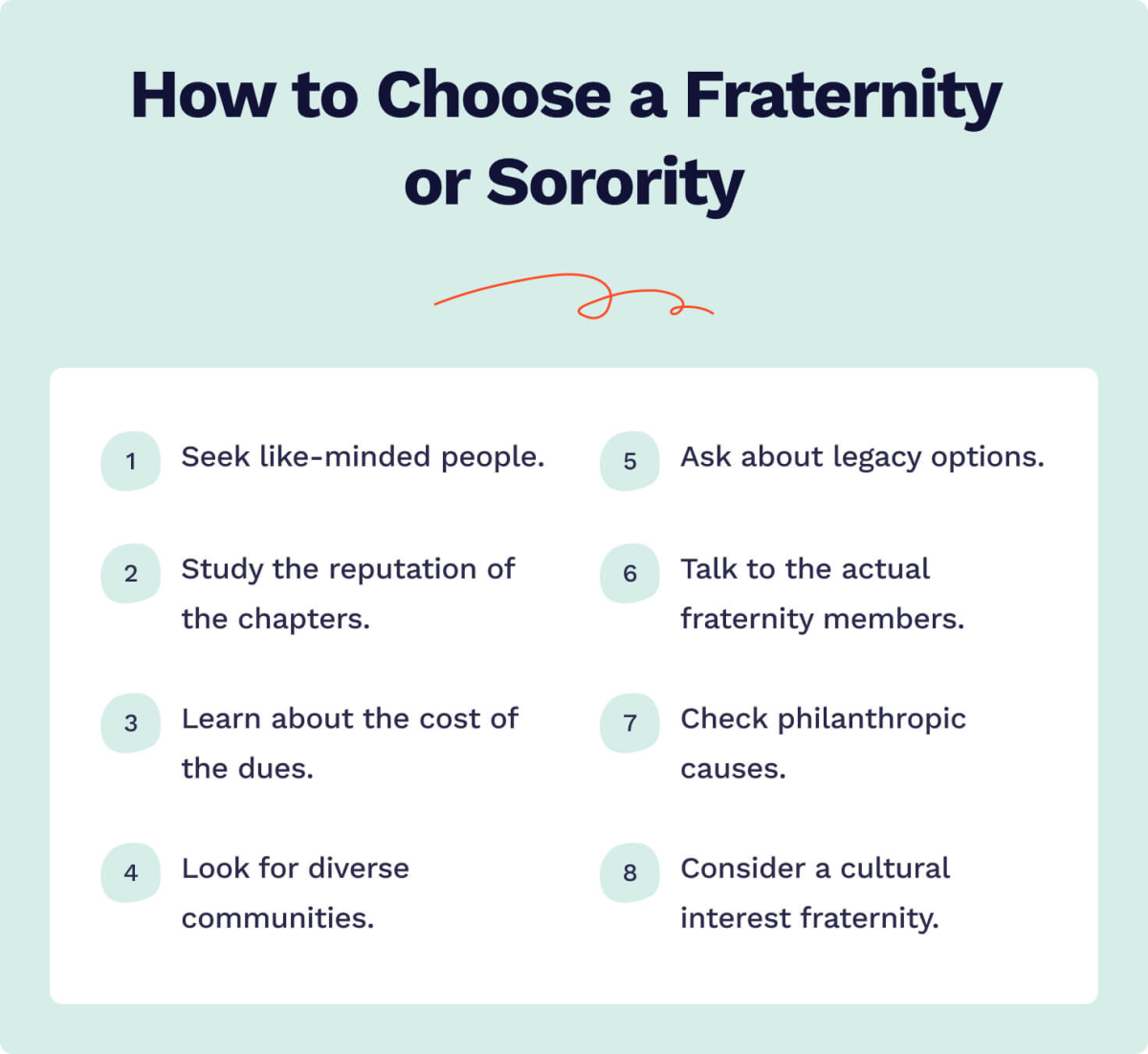
1. Look for Like-Minded People
This is the most important factor. Your potential fraternity must share your interests and values. To make the right decision, investigate and Google various Greek organizations on your campus. Most fraternities have a mission statement that you can find on their website or social media pages. Check it out to learn about their core values and principles.
2. Study the Reputation of All Chapters in Your School
Nowadays, it’s easy to do your research on practically anything, including every fraternity out there. So, aside from the organization’s website, make sure to look them up on news websites.
Many fraternities have more than a few skeletons in their closet. Look for the following information:
3. Learn about the Fraternity Dues
Joining student organizations can be pricey. They usually require you to pay for multiple things like entrance fees, rent, black-tie events, and even uniforms. These prices vary from one Greek organization to another. Usually, the sum is somewhere around $300-600 per semester.
4. Seek Diverse Communities
Back in their early days, fraternities were only there for privileged white men. Nowadays, they are very diverse and inclusive. So, be sure to pick one that has diverse members. Such an organization will expose you to various perspectives and experiences that will enrich your life. Besides, this way, you’ll promote and foster inclusivity and tolerance within your school.
5. Inquire about Legacy Options
You might have thought about carrying on the legacy of a previous member of your family who joined a particular sorority or fraternity. Being a direct descendant of a specific chapter member used to ensure admission, but that isn’t necessarily the case now. We recommend asking whether this option is available on the chapters that interest you.
At the end of the day, you are not obliged to join a chapter simply because a member of your family did. It’s all up to you!
6. Talk to Actual Fraternity Members
Getting to know fraternity’s current members is the best way to get real insights into the organization. You can ask anything that concerns you and get honest answers. Make as many friends from fraternities or sororities as possible so that it will be easier for you to get along with them once you join.
7. Check Philanthropic Causes
If a Greek organization is seriously engaged in philanthropy, it’s a big plus to their karma. Unlike some self-centered fraternities, they’re definitely not like that. You’ll be able to tell how high they value their reputation and how far their mission goes. It’s a good sign that they share your interests and values.
8. Consider Joining a Black, Asian, or Latinx Community
Many great cultural-oriented fraternities and sororities are waiting for students who cherish their heritage and want to contribute to racial equality. The members of these organizations protect and support one another. If you’re proud of your culture and want to strengthen your bonds with it, cultural-oriented fraternities are for you.
🔥 Top 24 Fraternities & Sororities to Choose From
So, you know how to tell a good fraternity from a bad one. Now, you probably want to know what the best fraternities and sororities are. Well, we’ve researched them for you and listed them below! We also included links to their official webpages so you can check them out for yourself.
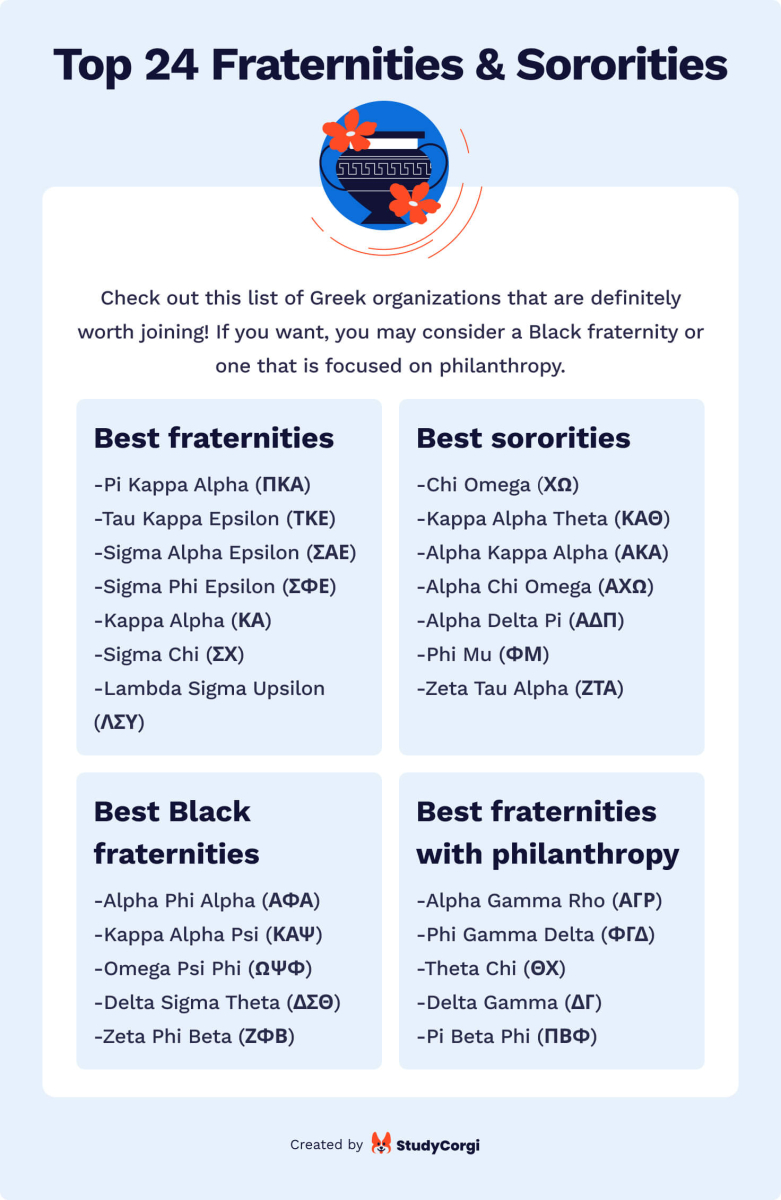
7 Most Popular Fraternities
7 Best College Sororities
Top 5 Black Fraternities & Sororities
5 Fraternities & Sororities with Philanthropy

🌎 Should International Students Go Greek?
Here’s another curious aspect of fraternities and sororities: they are the best places for international students to make friends and quickly adapt to a new culture. If you’re an international student, pay particular attention to this section!
- Making new acquaintances well be less stressful for international students who join fraternities or sororities. Your new “brothers” or “sisters” can assist you in adjusting to a new life in a different country and serve as your support network. Thanks to the frequent social activities, you’ll have plenty of opportunities to meet new people and build your identity around your found family.
- In addition, it will be easier for international students to get a job abroad. By joining fraternities, they will build a network of professional contacts. The opportunities continue even after graduation. The fundamental trait of Greek organizations is that once you join, you become a brother or sister for life. Your buddies can assist in finding job opportunities and providing support during job interviews. Besides, many top employers value fraternities membership, and some of them are alums themselves!
So, if you want to make the most out of your college experience in the US, go ahead and join a fraternity! We recommend you to choose one that provides an inclusive and supportive environment for international students.
🎁 BONUS: Famous Members of Fraternities & Sororities
While you’re still thinking about joining a student organization, let us tell you about some of the famous and influential people who were once a part of Greek life. They are great examples of how joining a fraternity or sorority may boost your career prospects and change your life for the better:
Greek life is a great opportunity and lots of fun, so give it a try! Do you have any stories about the colorful life in a fraternity or sorority? Feel free to share them in the comments!
